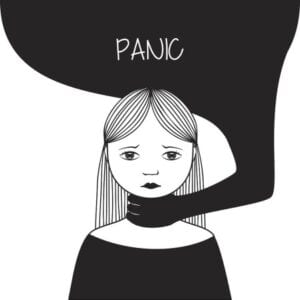
Why do I feel anxiety in my stomach and can anxiety cause stomach pain? Anxiety is a feeling of unease, nervousness, and uncertainty that can come over you without warning. It can strike at any time, and last for as long as it takes for your body and mind to return to normal. For some people, anxiety can be a chronic or lifelong feeling. For others, it can come and go in waves.
Imagine you’re about to take the biggest examination of your life. You’ve spent weeks studying and preparing. You’re ready to ace this test. However, your stomach is in knots. You feel nauseated and your heart is racing. You can’t focus. What’s happening to you? Have you ever experienced anxiety in your stomach? It’s a common feeling for many people. It can be triggered by anything that reminds us of our nervousness. For some people, it’s only a mild feeling. For others, though, it’s more intense.
Anxiety is more than just a feeling; it’s an emotional response to a problem. If you’re looking for more information about anxiety, read on for a deeper look at what anxiety is, the ways anxiety can impact your life, and how you can get help if you need it.
Contents
Can Anxiety Cause Stomach Pain?
Stress and anxiety are common causes of not only stomach pain but also other gastrointestinal tract symptoms. The cause of stomachache from anxiety or panic attacks is several stress-related issues since stress can take its toll on the digestive system. This stomachache is from stress-related issues such as abdominal tension, digestion issues, and irritable bowel among others.
Anxiety can cause stress that can be a single nerve-wracking event or chronic worry and chronic stress. You need to understand whether both your stress levels and digestive health need improving.
Unmanaged elevated stress or anxiety can lead to elevated levels of cortisol. The prolonged elevated cortisol levels can erode and damage the lining of the digestive tract causing stomach pain and other GI symptoms.
Moreover, when anxious or stressed, normal physiological processes may be interpreted as pain and this can include stomach pain. Some of the common stomach symptoms associated with stress and anxiety include stomach pain, cramps, sensitivity, or other discomfort.
Why do I feel Anxiety in my Stomach?
The brain and the stomach are connected by the Vagus nerve. It is one of the largest nerves in the human body. The working of the nerve is affected by neurotransmitters and hormones. Some of these chemicals are produced in great quantities when you are stressed or anxious.
The vagus nerve, which is affected by neurotransmitters and hormones, is one of the most important parts of the human body. It connects the brain to various organs, helping them communicate with each other. Thus, effects on the nerve can cause stomach symptoms of anxiety.
The vagus nerve runs from the brain stem down through your neck, chest, and abdomen. This nerve helps control a number of functions in your body, including digestion, heart rate, and blood pressure.
What does anxiety stomach pain feel like?
Anxiety stomach pain feels like knots, tightness, churning, or cramping, in your stomach with some individuals getting nausea and even vomiting. These symptoms and signs emanate from stress and anxiety effects on the stomach due to its relation with the central nervous system.
The anxiety stomach pain symptoms are seen both in anxiety disorders and panic attacks. Anxiety can cause the body to increase the production of stomach acid due to the elevated amounts of stress hormone (cortisol) released during anxious moments.
With regular anxiety stomach pain, you may develop irritable bowel syndrome (IBS) and other digestive tract conditions. This is because the constant production of increased amounts of stomach acids can corrode the lining of the stomach and other intestinal organs.
To manage anxiety stomach pain, you can try ginger ale. The drink helps in calming the anxious stomach giving you relief in the short term but discussing with your doctor a long-term solution is recommended.
Causes of Anxiety in the Stomach
The nervousness you’re feeling in your stomach is a very common symptom of anxiety and panic. Anxiety causes the release of stress hormones, which can make you feel uneasy or have a “butterflies in the stomach” sensation.
It can also trigger nausea or cause you to feel your heart beating faster. It’s best to consult with a doctor about this. They will be able to tell you what’s causing it and what you can do to manage it.
There are many causes of anxiety, but some common ones are:
- Stressful events
- Fearful thoughts
- Poor coping skills
- Loneliness
- Depression
- Alcohol or drug abuse
- Medical conditions such as hyperthyroidism, hypoglycemia, irritable bowel syndrome, ulcers, and high blood pressure
Do You Have a Nervous Stomach?
Your stomach and brain are connected by the vagus nerve. This is one of the largest nerves in your body. The nerve is used to send communication between the gut and the brain.
Anxiety affects the way the brain works thus affecting gut motility. Anxiety can lead to a feeling of unease in the stomach, and in some people, it causes more serious symptoms. Some people experience nausea, vomiting, or diarrhea.
Others have a sense of fullness from their stomach and may be constipated or have irregular bowel movements.
Why is anxiety felt in the stomach?
When you are anxious or stressed, there are hormones and neurotransmitters that are released in your body. The chemicals have an effect on gut motility. Gut motility is the way the GIT pushes food from one section of the gut to the next and also pushes excreta from the body.
When anxious, gut motility is greatly impacted causing stomach anxiety. There are many causes of anxiety, and one of the most common is chronic stress. When we experience a stressful event, it’s normal for our bodies to release hormones like cortisol, which help us escape or avoid the situation.
But if we continue experiencing stressful events on a regular basis, this becomes less effective because the body doesn’t release enough cortisol. This can cause our gut motility to be negatively impacted, which can make people feel more anxious than they would if they weren’t stressed.
It’s also worth noting that stress may also lower stomach acid levels, which can lead to feelings of unease in the stomach.
Symptoms of Anxiety
Some of the most common symptoms of anxiety are:
- Unease, nervousness, and uncertainty
- Dread, a sense of impending danger or doom
- Intense worry or fear that’s out of proportion to the actual situation
- Feeling restless, keyed-up, or on edge
- Nervousness, tension, panic attacks
- Difficulty concentrating on anything but the source of your anxiety
- Physical symptoms like stomachaches, dizziness, headaches, or feeling faint
- Difficulty sleeping or staying asleep due to anxiety-related thoughts.
Ways to Manage Anxiety in the stomach
If you treat the anxiety, you may reduce the incidences of a nervous stomach. If you experience anxiety in your stomach, there are many natural ways you can combat it.
- Some methods include eating healthy foods like fruits or vegetables.
- You should also make sure to drink a lot of water and get plenty of exercises. By staying hydrated and active, you’ll be able to fend off any symptoms of anxiety that may come up. Some people who experience anxiety can find relief by drinking plenty of water. It might not work for everyone, but it’s worth a try.
- Another way to combat this feeling is by taking deep breaths in and out. This will help calm your body down and relax the muscles in your stomach.
- Yoga is another great way to manage this feeling because it promotes mental awareness and stability.
- Exercise: Exercise is a great way to release endorphins, which are natural chemicals that make people feel good. Regular exercise can also lead to weight loss and increased energy levels, which may help reduce anxiety.
- Meditation: Meditation can help relieve the symptoms of anxiety. It calms the brain and enables you to sleep well and relax
Other ways of managing anxiety in the stomach include:
- Make sure you’re getting enough sleep
- Practice relaxation techniques
- Use healthy coping mechanisms
- Keep a journal
- Talk to your doctor
Counseling for Anxiety

Counseling is one option for anxiety treatment. Counseling can help you work through the thoughts and feelings that lead to your anxiety, and find ways to live with it more comfortably.
Counseling can also provide you with a good opportunity to talk about your anxiety with someone other than a therapist. Talking about your symptoms with people who have shared your experience may be very helpful in learning how to cope with them, as well as providing some much-needed support.
Counseling can be an effective treatment for chronic or acute anxiety because it provides a supportive environment where you can discuss the thoughts and feelings that are leading to your anxiety without judgment or criticism.
Therapy teaches you new ways of understanding what has happened in the past, and how that might be affecting the present. It helps you come up with new ways of coping when faced with triggers, so that you don’t feel like all hope is lost—and so that you know what will help when life gets hard.
Other Tips for Managing Anxiety in the Stomach
If you’re dealing with anxiety in your stomach, there are a few things you can do to help.
- Breathe. Take a deep breath and try to relax. Try to focus on the sensation of your breath moving in and out of your body. Focus on the way it feels as it passes through your nose or mouth and into your lungs, then back out again. By focusing on this simple bodily function, you will be able to calm yourself down by distracting yourself from the sensations that are making you anxious in the first place.
- Take small steps. Don’t take large leaps when facing anxiety in the stomach during an exam or another stressful situation. Break things down into smaller pieces by taking small steps at a time so that completing one step won’t feel overwhelming for you.
- Play some music or sing along with it (or someone else). Listening to music is a great way to distract yourself when experiencing stress like anxiety in the stomach during an exam or other stressful situations because music engages both our auditory system and our motor system, which helps us relax more quickly than just our auditory system alone can do. You could sing along with the song if you want extra stimulation for your brain! Or, find someone who likes singing along and have them join you while they’re accompanying themselves on an instrument–that’s even better!
- Eat spicy foods before big events: Spicy food cause a mild natural warming stimulation in the stomach which can help prevent an anxious stomach.
What Is Anxiety?
Anxiety is a feeling of unease, nervousness, and uncertainty that can come over you without warning. It can strike at any time and last for as long as it takes for your body and mind to return to normal.
For some people, anxiety can be a chronic or lifelong feeling. For others, it can come and go in waves. For many people with anxiety, the feeling manifests as physical symptoms like stomachaches, dizziness, or headaches.
Others feel a sense of dread or hopelessness which leads to feelings of depression. Many people with anxiety also feel the need to take more and more of the same type of medication even if it’s not helping their symptoms.
Anxiety is an emotional response to a problem. When you have anxiety you are experiencing strong negative feelings related to an event that has the potential to produce an unpleasant outcome.
You may experience these feelings hours before the event or sometimes days in advance of it–even when there’s no obvious threat involved. Anxiety is often accompanied by physiological arousal such as increased heart rate and sweating–even when there’s nothing wrong with the event in question! This type of response is known medically as “anticipatory anxiety.”
What Causes Anxiety?
So, what causes anxiety? The factors that lead to anxiety can be varied, but they all stem from the same thing: fear. Fear of the future or fear of the past, fear of not being good enough, or fear of things going wrong.
You might have a fear of heights, a fear of dogs, or a fear of flying. In other words, many people experience anxiety when they feel like they don’t have control over their situation.
The anxiety may be a result of memories developed in childhood that can make you feel anxious when you see something, smell, or even hear something.
What Is Anxiety in the Stomach?
Anxiety in your stomach is a feeling that can be triggered by many things: exams, public speaking, or even just the thought of something you’re nervous about. This feeling sometimes begins as butterflies in your stomach but can progress to serious discomfort.
It may start out as a mild feeling but often intensifies until it feels like you are being stabbed from within. The term “butterflies in your stomach” is often used to describe this uncomfortable feeling.
When you have anxiety in your stomach, you might feel a bit queasy and have difficulty concentrating. You might also feel an increased heart rate, sweaty palms, and clammy skin. But the main symptom of anxiety in your stomach is the feeling that something terrible is about to happen and there’s nothing you can do about it.
Treatments for Anxiety
If you feel like your anxiety is taking a toll on your life, it’s important to talk to your doctor. They can help you decide if your symptoms are something you should be concerned about, or if there are ways to manage the problem.
In some cases, treatments for anxiety involve prescription medications. In other cases, they might involve counseling or therapy. If you think a treatment plan that includes medication is right for you, there are several anxiety medications that have been approved by the FDA and prescribed by doctors.
The most common types of prescription medications used to treat anxiety include benzodiazepines and antidepressants. In addition, you can use buspirone to treat anxiety. Understanding how anxiety may impact your life and knowing how to seek treatment can go a long way in helping you put yourself on the path to overcoming this emotional response to stressors in your life.

What helps anxiety in the stomach?
Anxiety is an emotion that can make people feel unease, nervousness, and uncertainty. It can strike at any time and last for as long as it takes for the body and mind to return to normal. For some people, anxiety can be a chronic feeling. For others, it can come in waves.
For some people the cause of their anxiety will be obvious but for others, it may be more of a mystery.
Wherever it comes from and whatever the cause, anxiety can have a big impact on your life; some people with anxiety experience it as a sense of dread while others feel overwhelming worry or nervousness. For many people with anxiety, it manifests itself physically in stomachaches or headaches.
Others feel despair and hopelessness which often leads to depression. Many people with anxiety also feel the need to take more and more medication even if it is not helping their symptoms; this is known as self-medicating with drugs or alcohol which only worsens the problem since drugs are addictive substances.
Anxiety is more than just a feeling; it’s an emotional response to a problem. If you’re looking for more information about anxiety read on for a deeper look at what anxiety is, how it affects your life, and how you can get help if you need it.
When you experience anxiety, the body releases hormones and neurotransmitters (chemicals that regulate the brain function) which affect the digestive system since the vagus nerve links the brain to the gut.
It can result in nausea, diarrhea, or even constipation. Is anxiety related to gut health? It may be. When nervous or anxious, your body releases some hormones and chemicals that enter the digestive system which can cause nausea, diarrhea, or constipation.
That’s because all of these things are controlled by the same part of your brain that deals with fear and stress – the amygdala. Furthermore, it doesn’t take a lot to set off those feelings of anxiety.
A small trigger can have a large effect on your stomach – physically and emotionally. Once you’re aware that you need to take care of your stomach when feeling anxious, you can find ways to do so without overindulging in unhealthy foods or drinks like coffee or alcohol.
The key is finding healthy methods for managing anxiety-related symptoms in your stomach without worsening them further. You could try deep breathing or relaxing yoga poses if you find yourself experiencing symptoms like a racing heart rate and an upset stomach often
What kind of stomach problems can anxiety cause?
Anxiety can cause a range of stomach problems. They include:
- Upset stomach after eating
- Diarrhea
- Constipation
- Cramping and/or bloating
- Heartburn
- Acid reflux
- Nausea
- Vomiting
Anxiety disorders can increase susceptibility to gastrointestinal symptoms and worsen the severity and frequency of these symptoms. There are a few ways anxiety can affect your digestion.
One way is through stress hormones that make your organs work more slowly or improperly. Another way is by causing you to have too many stomach contractions or spasms.
Lastly, anxiety can also cause nausea and vomiting which further affects the gut’s ability to digest food. It’s important to note that anxiety doesn’t always cause these side effects in everyone, but it’s a possibility for some people with anxiety disorders.
Pulse in the stomach due to anxiety
Anxiety can increase a person’s pulse or heart rate, or cause a person to have trouble breathing. If you’re feeling these symptoms of anxiety, it’s time to get some help.
Anxiety is a strong feeling of worry and nervousness. It can happen at any time, and it’s normal for people to feel anxious at certain points in their life.
Some people only experience anxiety during high-stress times, like before a test or an important meeting. Other people may feel anxious all the time, which can interfere with day-to-day activities like work and school. Anxiety can cause different sensations in the body.
You might feel your pulse in your stomach or notice that you’re breathing more quickly than usual.
Why do I feel butterflies in my stomach for no reason?
Due to various reasons, the blood vessels in your gut can constrict while the digestive muscles contract, making you feel nauseated and anxious. Many people feel a sense of anxiety in their stomach for no reason.
The blood vessels surrounding your stomach and intestines constrict and the digestive muscles contract, making you feel nauseated, anxious, and sometimes even a little bit gassy.
It’s important to note that these sensations are all in your head; it’s not an actual physical condition. This sensation is often triggered by something that reminds you of your nervousness, like the biggest test of your life or the day of a big interview at work.
When you see those images flash through your mind, your nerves react to them with feelings of dread in your stomach. This is known as “visceral anxiety” because it happens without any control from the brain. It’s also called “gut instinct.” There are many things that can cause this feeling of anxiety in our stomachs.
One cause might be a panic attack – when you experience intense physical symptoms (like chest pain) along with psychological ones (like worrying about being late). Other causes might include eating spicy foods or drinking alcohol before an event or staying up too late the night before it takes place.
Does anxiety feel like butterflies in your stomach?
When you have anxiety and stress, you can experience knots in your stomach, nausea, vomiting, and a rapid heartbeat. If you’ve experienced these symptoms before, you know what it feels like.
But why do I feel anxiety in my stomach? Your body can have many different reactions to stress and anxiety. Anxiety can make your body release adrenaline, which increases your heart rate and blood pressure.
It also makes you breathe faster than normal. Stress and anxiety can also decrease the amount of digestive acids in your stomach, making you feel nauseous or throw up. It sounds so simple but there are steps you can take to prevent this from happening again.
You may need some time to build your confidence back up after experiencing a particularly stressful event or situation. But there are also ways for you to manage stress and prevent it from causing serious problems for you in the future.
Can anxiety cause weird body sensations?
Anxiety makes your body to start preparing for danger. This preparation can cause many sensations in our bodies (alarm reactions) and our bodies react to the stress.
Some people might have an increased heart rate, sweaty palms, nausea, or even a headache. These symptoms are all related to anxiety and how it can make you feel physically uncomfortable.
Conclusion
Anxiety is a normal reaction to any situation in which your brain perceives danger. This danger can be something specific, like a test or interview, or it can be something more general, like social anxiety or the fear of being alone. Regardless of the cause, anxiety is an unpleasant feeling that you might feel when you are anxious about something.
Feeling anxious is a common experience. Anxiety can affect anyone at any time. Anxiety is a normal and adaptive response to stress. However, sometimes our reaction to stress is a little over the top. A common symptom of anxiety is worry, which can be a normal part of life.
However, excessive worry can be a sign of an anxiety disorder. However, we can’t simply say that anxiety is bad – it’s a part of our normal response to stress. But this doesn’t make it any easier.
Anxiety affects millions of people every day, often making their life challenging and difficult. Many people have anxiety on a daily basis, and it can affect just about anyone. The good news is that there are things that you can do to help relieve your anxiety and improve your quality of life.
FAQs
Can anxiety cause stomach pain?
Yes, anxiety and other emotional disorders can cause stomach pain by affecting movement and spasms of the gastrointestinal tract. This is a common effect of anxiety in some people. All these stomach issues are a result of a physical toll on your digestive system due to anxiety or stress.
Where does your stomach hurt with anxiety?
Persons suffering from anxiety have a higher cortisol level in the body as compared to other persons and this can increase the production of stomach acids. The stomach acids when excessive can corrode the lining of the esophagus leading to stomach pain.
What does an anxiety stomach ache feel like?
Pain in the stomach due to anxiety feels like knots in the stomach. This is because the spasms, increased stomach acids, and effects of anxiety on the movement of food can cause stomach aches felts as knots. The effect of the knots is that some people will feel nauseated and even vomit due to anxiety.
Can stress and anxiety cause stomach pain for days?
Yes, stress and anxiety can cause stomach pain for days if the stressing agent is not removed near the individual. The issues may not be resolved until you are able to manage anxiety in your body and brain.
